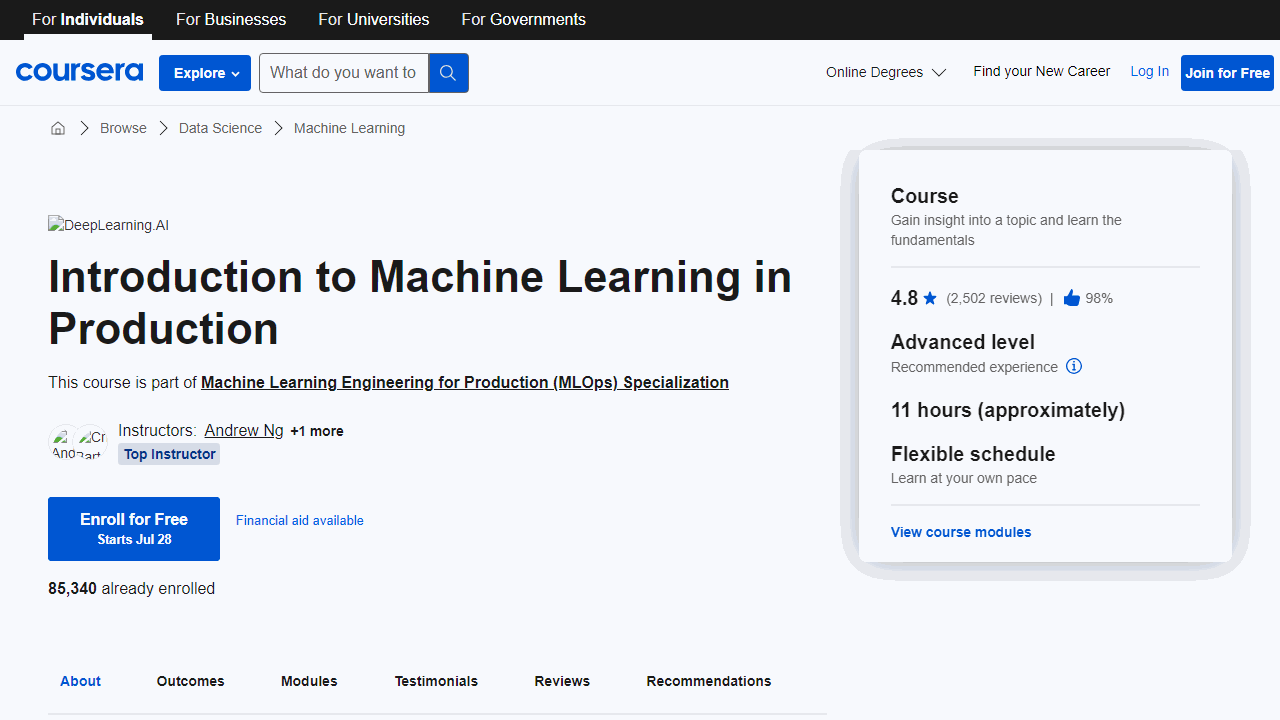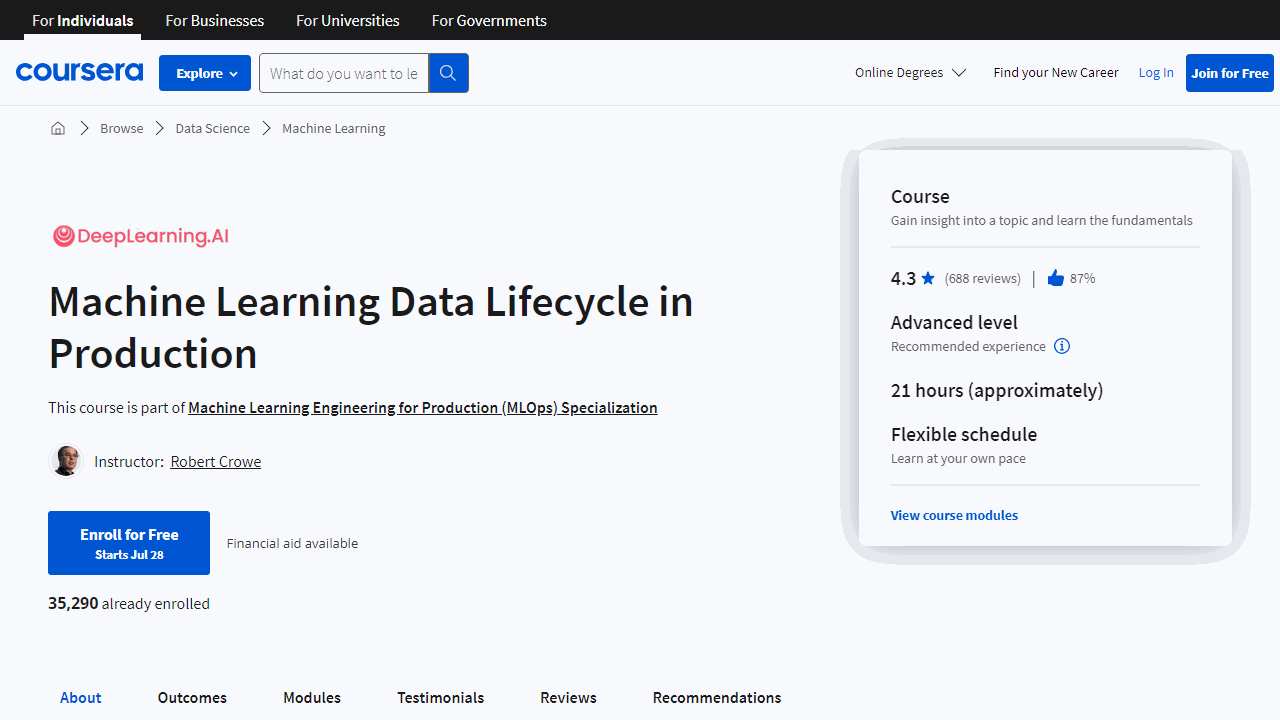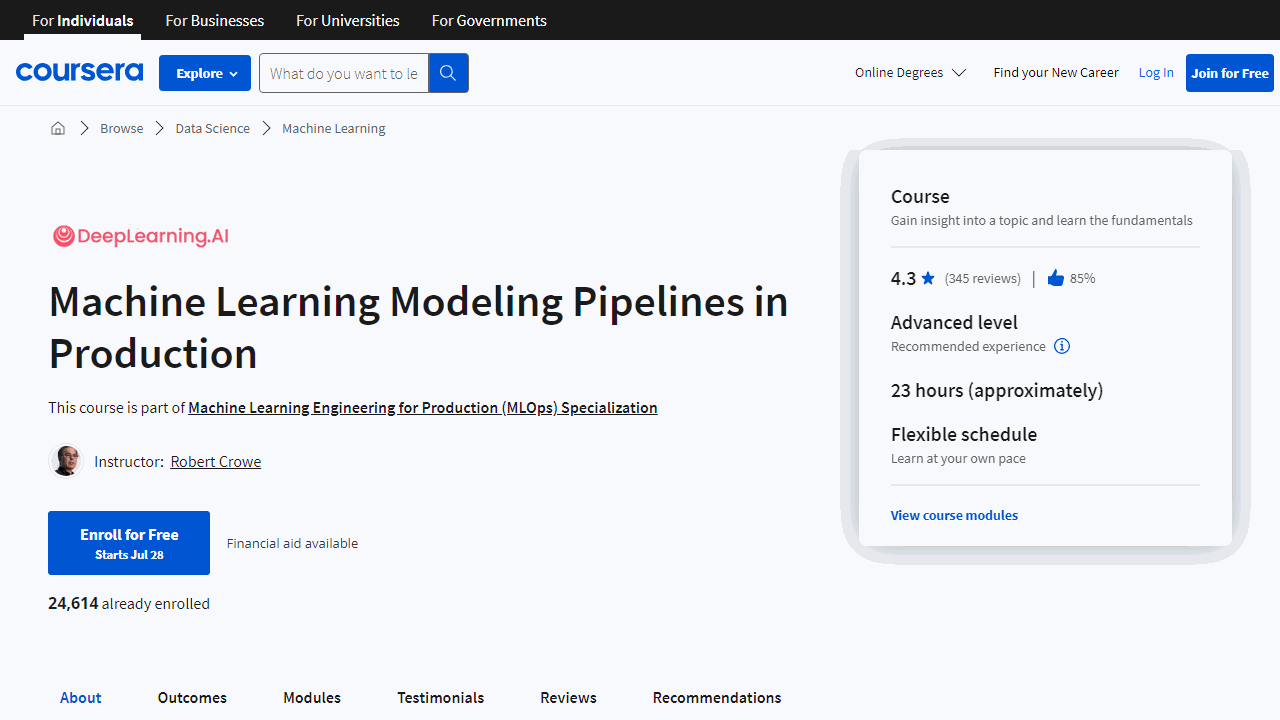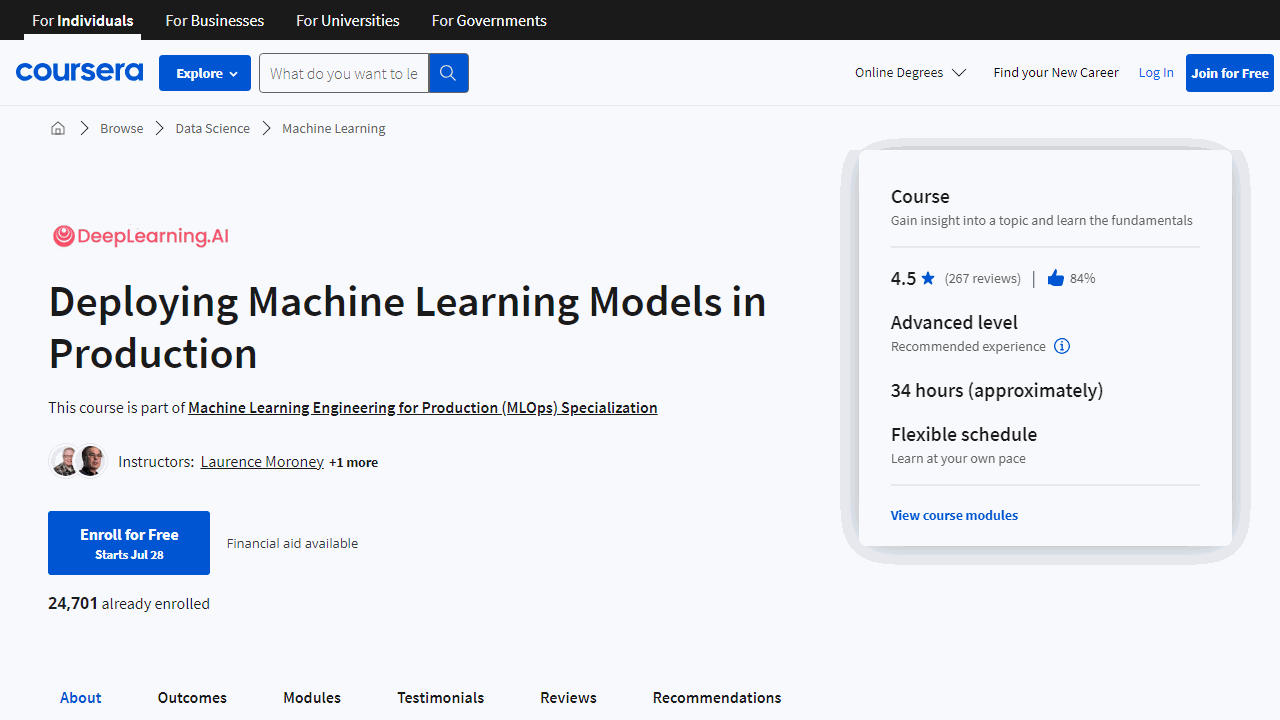- Provider: DeepLearning.AI
- Teacher: Andrew Ng, Robert Crowe, Laurence Moroney
- Price: $49/month with a 7-day free trial
- Duration: Approx. 4 months if you study 6 hours per week
- Pre-requisites: intermediate Python, basic knowledge of deep learning/machine learning, experience with a deep learning framework (e.g. Keras, TensorFlow, PyTorch)
- Level: Advanced
- Certificate: Yes
- Coursera Plus: No
Are you struggling to navigate the vast sea of information on Machine Learning Engineering for Production (MLOps)?
You’re not alone.
Many aspiring MLOps learners find themselves overwhelmed, unsure where to begin or how to sift through the countless resources available.
This lack of direction and clarity can turn your learning journey into a daunting task.
But don’t worry – there’s a comprehensive, practical solution to your problem.
Coursera’s Machine Learning Engineering for Production (MLOps) Specialization, provided by the reputable DeepLearning.AI, is precisely the learning path you need.
This specialization is led by world-class experts like Andrew Ng, Robert Crowe, and Laurence Moroney, providing you with top-tier instruction and guidance from their extensive experience at Google.
You’ll get hands-on experience with real-world scenarios and projects, equipping you with practical skills to apply in the field.
By the end of it, you’ll have a firm grasp on MLOps, opening up new opportunities and elevating your career.
Let’s take a closer look at what this specialization has to offer.
Introduction to Machine Learning in Production
- Rating: 4.8/5 with 2.502 ratings
- Duration: Approx. 11 hours
The course is taught by Andrew Ng, a renowned expert in the field of AI, which guarantees a high-quality learning experience.
His teaching style is praised for its ability to simplify complex concepts, making them easy to grasp.
The course content is engaging and interesting, so much so that you may find yourself completing it in a shorter time than expected.
It’s not all theory either. The course includes real-life examples and experiences that make the learning process more practical and applicable in real-world scenarios.
One of the major takeaways from the course is the shift it encourages from a code-centric to a data-centric mindset.
This is a crucial shift needed in the real-world application of machine learning.
The course is also beneficial for those with a strong background in deep learning and machine learning who are looking to start a real-time project or lead a machine learning team.
It provides a structured way to analyze different situations that arise during a machine learning project life-cycle, which can be a game-changer in your ML projects.
The content provided is clear, and the examples given by the professor are extremely insightful.
This course provides a well-designed and clear foundation about Machine Learning in production, making it a must for anyone serious about ML.
What You Will Learn
- Understand the steps involved in a Machine Learning (ML) project, from conceptualization to deployment.
- Explore the key challenges faced in ML projects, such as skewed datasets and performance auditing.
- Learn about deployment patterns and monitoring techniques to ensure the smooth operation of ML models.
- Delve into the intricacies of data-centric AI development, including data augmentation and feature addition.
- Discover the importance of establishing a baseline and conducting error analysis in ML projects.
- Gain insights into the process of scoping, including diligence on feasibility and value, and setting milestones and resources.
- Understand the concept of Human Level Performance (HLP) and strategies to raise HLP in ML models.
- Learn about the importance of balanced train/dev/test splits in ML projects and how to achieve them.
- Understand the significance of meta-data, data provenance, and lineage in ML projects.
- Learn how to manage and track experiments in ML projects, ensuring the project stays on track and meets its objectives.
Machine Learning Data Lifecycle in Production
- Rating: 4.3/5 with 688 ratings
- Duration: Approx. 21 hours
This course is a treasure trove of information that will help you understand the lifecycle of data in a production environment, with a special focus on TensorFlow Extended (TFX), Google’s ML pipeline stack.
One of the key strengths of this course is its practical approach.
You will get hands-on experience with practical examples and assignments in Jupyter Notebook.
This will not only solidify your understanding of the concepts but also give you a taste of real-world scenarios.
The course covers the general data life-cycle pipeline in production.
This includes everything from data collection, labeling, validation, to feature engineering, transformation, selection, and data journey and storage.
The comprehensive coverage of these topics ensures that you get a holistic understanding of the data lifecycle in a production environment.
Another highlight of this course is the modern technologies and libraries it introduces.
These are not only up-to-date but are also highly applicable to current projects. This makes the course extremely relevant and useful for those working in the field.
The course is also a great opportunity to learn about Google’s ML pipeline stack, TFX.
This knowledge could be invaluable, especially if you’re planning to work with Google’s ML technologies.
The instructor does an excellent job of explaining concepts clearly, with plenty of examples for you to practice and better understand TFX.
What You Will Learn
- Understand the importance of data in machine learning and how it impacts the overall ML pipeline.
- Learn about responsible data handling, focusing on security, privacy, and fairness.
- Analyze case studies on degraded model performance and learn how to troubleshoot such issues.
- Gain knowledge on detecting data issues, like concept drift, using TensorFlow Data Validation.
- Master preprocessing operations and feature engineering techniques to improve the quality of data.
- Explore different feature selection methods including filter, wrapper, and embedded methods.
- Understand the concept of ML Metadata and its role in schema development and environments.
- Learn about data storage options such as feature stores, data warehouses, and data lakes.
- Dive into advanced learning techniques like semi-supervised learning, active learning, weak supervision, and data augmentation.
- Get a grasp on handling time series data and working with sensors and signals in machine learning.
Machine Learning Modeling Pipelines in Production
- Rating: 4.3/5 with 345 ratings
- Duration: Approx. 23 hours
This course provides a comprehensive overview of a machine learning system in a production environment.
Like the other courses, it’s not just theoretical; it focuses on the bigger picture and the constraints you need to address when deploying models.
This makes it highly relevant to your day-to-day work.
You’ll gain a strong foundation in MLOps and learn how to manage ML pipelines in production.
This knowledge is consistent with other courses in the MLOps specialization, providing a well-rounded understanding of the subject.
The course covers a wide range of topics, giving you a thorough understanding of what MLOps is and how to approach it correctly.
One of the standout features of this course is the quality of the lectures.
Moreover, the course offers practical ideas on how to improve your models and make your workflows more efficient.
Even though some reviews complain that the labs are based on Google Cloud, they are well-prepared and contribute significantly to the learning experience.
The material and guides provided in the course are also excellent resources to help you grasp the concepts better.
By the end of it, you’ll be excited to put your newfound knowledge into practice.
What You Will Learn
- Understand the concept of hyperparameter tuning and its role in machine learning models.
- Learn how to use Keras Autotuner for efficient model tuning.
- Gain knowledge about AutoML, its benefits, and how to measure its efficacy.
- Explore the concept of dimensionality in machine learning and its effect on performance.
- Learn about different dimensionality reduction techniques, including manual and algorithmic methods.
- Understand the process and benefits of quantization, pruning, and distributed training in machine learning.
- Learn about knowledge distillation techniques and their application in teacher and student networks.
- Gain skills in model performance analysis using tools like TensorFlow Model Analysis.
- Understand the importance of model debugging, sensitivity analysis, and adversarial attacks.
- Learn about fairness in machine learning models, how to measure it, and its importance in continuous evaluation and monitoring.
- Gain knowledge about explainable AI and various model interpretation methods.
- Learn how to use model agnostic methods, partial dependence plots, and permutation feature importance for model interpretation.
- Understand the concept of Shapley Values and SHapley Additive exPlanations (SHAP) in model interpretation.
- Learn about testing concept activation vectors and how to use LIME for model explanation.
Deploying Machine Learning Models in Production
- Rating: 4.5/5 with 267 ratings
- Duration: Approx. 34 hours
This course offers a comprehensive overview of major concepts in deploying machine learning models.
It doesn’t just skim the surface, it delves deep into real-world production deployment, providing you with practical insights that you can apply in your work.
This is where the experience of the instructors at Google really shines through.
This is not just a theoretical course that leaves you wondering how to apply what you’ve learned.
Instead, it prepares you for the realities of deploying machine learning models in production, providing a solid foundation that you can build upon.
You won’t just be passively listening to lectures - you’ll be actively involved in learning, which is a more effective way to absorb information.
Plus, the course provides a good starting point for personal implementation of ML models, giving you the tools and knowledge you need to start experimenting on your own.
For professionals already working in production environments, this course is a godsend.
It provides a path of “best practices”, helping you to streamline your work and take advantage of tools you might not have been aware of.
This course is also a great introduction to MLOps for those interested in the tools used by AI teams at Google, Facebook, and other tech giants.
It covers a wide set of subjects related to MLOps, giving you a broad understanding of the field.
Lastly, the course includes real-life projects that can be directly applied in business scenarios.
This is a huge advantage, as it allows you to see how the concepts you’ve learned can be used in a practical context.
What You Will Learn
- Understand the basics of model serving and its infrastructure, which is crucial for deploying machine learning models in a production environment.
- Explore various deployment options and learn how to improve prediction latency while reducing resource costs.
- Gain hands-on experience in creating and deploying models to AI Prediction Platforms using TensorFlow Serving.
- Delve into the architecture of model serving and get acquainted with other model servers apart from TensorFlow.
- Learn about scaling infrastructure and online inference, which are key aspects of deploying machine learning models.
- Understand the importance of data preprocessing and batch inference scenarios, and learn how to perform batch processing with ETL.
- Learn about managing model versions and the concepts of continuous and progressive delivery in the context of machine learning models.
- Understand the importance of monitoring in machine learning, and learn about observability, monitoring targets, logging, and tracing in ML systems.
- Learn about model decay, its detection, and ways to mitigate it.
- Understand the legal requirements for secure and private AI, including concepts like anonymization, pseudonymisation, and the right to be forgotten.
Frequently Asked Questions
How Long Does It Take To Complete The Machine Learning Engineering for Production (MLOps) Specialization?
It’s estimated to take approximately 4 months to complete if you study around 6 hours per week.
This means the total duration of the specialization is roughly 96 hours.
However, the actual time it takes can vary depending on your prior knowledge, learning pace, and the amount of time you can dedicate to the courses each week.
How Much Does The Machine Learning Engineering for Production (MLOps) Specialization Cost?
The Machine Learning Engineering for Production (MLOps) Specialization on Coursera costs $49 per month.
This fee gives you access to all the course materials, graded assignments, and a certificate upon completion.
The specialization also offers a 7-day free trial, allowing you to explore the course content before committing to the monthly fee.
Please note that prices may vary depending on your location and any promotions Coursera may be running at the time.
Is The Machine Learning Engineering for Production (MLOps) Included In Coursera Plus?
No. Coursera Plus subscribers do not have access to this specialization.
What Is The Difference Between A Coursera Course And A Specialization?
A Coursera course is a single, standalone module that focuses on a specific topic. It includes video lectures, readings, quizzes, and sometimes a final project or exam.
Once you complete a course, you receive a certificate of completion.
On the other hand, a Coursera Specialization is a series of related courses designed to help you master a specific topic.
Specializations are structured to provide a deeper, more comprehensive understanding of a subject area.
They often culminate in a capstone project that allows you to apply what you’ve learned throughout the courses.
Once you complete all the courses in a Specialization, you receive a Specialization certificate.
So, the main difference is that a course is a single module on a specific topic, while a Specialization is a series of related courses designed to provide a comprehensive understanding of a broader subject area.
How To Get The Machine Learning Engineering for Production (MLOps) Specialization For Free?
Coursera offers financial aid for students who cannot afford the fee.
You can apply for financial aid by clicking on the “Financial aid available” link next to the “Enroll” button on the course page.
You’ll need to fill out an application and wait for approval, which can take up to 15 days.
Also, Coursera occasionally offers promotions or discounts, so it’s worth checking their website regularly.
Please note that while you may be able to access some course materials for free during a trial period, you typically need to pay for the course to receive a certificate.




